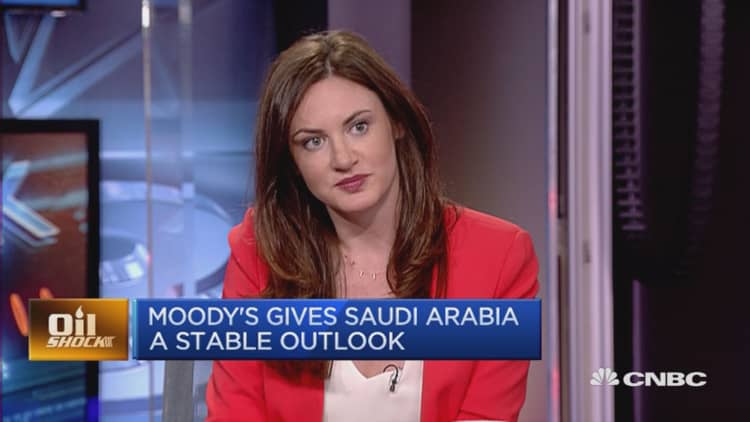The economic pressure on Saudi Arabia showed little sign of relief this week, despite the country delivering its bold new vision for the economy in April.
With the world's largest oil exporter heavily reliant on the commodity, it's been plagued by the plunging prices. And the bad news keeps on coming in spite of the recent uptick in price. CNBC highlights what's happened in the last seven days.
IMF forecast
The International Monetary Fund (IMF) said Thursday that real gross domestic product (GDP) growth for the country is projected at 1.2 percent this year, down from 3.5 percent in 2015.
The global organization added that lower oil revenues have resulted in current account and fiscal deficits which are projected to be around 9 and 14 percent of GDP, respectively, in 2016, according to IMF staff forecasts.
Bond sale
Also on Thursday, the Financial Times - citing people familiar with the situation - reported that Saudi Arabia is advancing plans for its first international bond sale. Analysts at BNP Paribas have linked Saudi Arabia's increased borrowing with the fact that the kingdom's current deficit levels are unsustainable.
"Public borrowing has begun to play a bigger role in financing the fiscal deficit, which slowed down the erosion in fiscal reserves. But, as noted above, the lack of transparency in public borrowing makes it difficult to monitor fiscal developments," the French banks said in a note on Thursday.
Cash buffers
These reserves came to light this week with the U.S Treasury indicating Monday that Saudi Arabia's central bank held $116.8 billion in U.S. debt at the end of March. Bloomberg added that it has about $587 billion in total foreign reserves.
BNP Paribas said the "continued rapid decline" in foreign-exchange reserves should be ringing alarm bells. "The decline in reserves (from 2015) far exceeds the current account deficit, which implies that, in addition to the terms-of-trade shock, the country is also facing capital outflows," it added.
IOUs for contractors?
On Wednesday, Bloomberg reported that the country is considering paying its contractors with IOUs, citing people briefed on the discussions. Saudi Arabia has slowed payments to contractors and suppliers working on the kingdom's infrastructure projects, according to the news agency, which may mean that some form of bond-like deals would be more beneficial to the contractors not being paid at all. Nonetheless, it adds to a growing picture of the dire straits the country now finds itself in.
"Without meaningful reform, we believe Saudi Arabia faces another protracted cycle of stagnation and decay as the most recent boom unwinds – a disturbing, and, we believe, highly motivating prospect given that the Kingdom's population is now twice as large as it was when the last boom went sour," Simon Williams and Razan Nasser, two economists at HSBC, said in a note on Tuesday.
Downgraded




On Saturday, ratings agency Moody's downgraded Saudi Arabia's credit rating by one notch, noting the fall in oil prices. It said the government had "ambitious and comprehensive" plans to address the shock by diversifying its economic and fiscal base, but added that those plans are at an early stage of development and their impact remained uncertain.
...and now the good news
The kingdom has a plan. In April, the government unveiled a long-term economic blueprint for life in a low-oil-price world. Titled "Saudi Vision 2030," the plan includes regulatory, budget and policy changes that will be implemented over the next 15 years.
Timothy Ash, the head of emerging markets at Standard Bank, believes the vision creates huge potential for foreign companies to help with the transition.
"I am not worried about their ability to pay ... they have lots of cash, and ability to borrow a lot, plus lots of assets to sell," he told CNBC via email.




